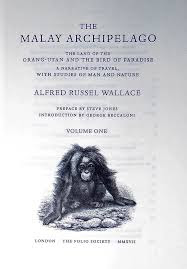I always used to feel rather sorry for Wallace, who always struck me as a rather tragic case of missing the boat. He was a nineteenth century naturalist that had the idea of evolution at the same time as Darwin, and wrote to Darwin (a much wealthier, older man) to share it with him, which prompted Darwin to hurry up and publish his own existing paper on the idea quickly himself. Thus, Darwin ends up the discoverer of evolution; he is the famous one; the adjective is Darwinian and not Wallacian. What we learn from this, is don’t respect your elders. Lesson aside, after reading this book I no longer feel sorry for Wallace. He had an amazing life and enjoyed himself to the max.
This book is the account of his eight years expedition around Singapore, Malaysia, Indonesia and East Timor in the 1850s. In summary, it was off the hook, and he loved it, mystery fevers and diarrhoea aside. Here he is, finding a place to keep the alcohol for his insects, and a place for himself to sleep:
. . . I thought it safer to leave my case of arrack securely placed in the fork of a tree. To prevent the natives from drinking it, I let several of them see me put in a number of snakes and lizards; but I rather think this did not prevent them from tasting it. We were accommodated here in the verandah of the large house, in which were serveral great baskets of dried human heads, the trophies of past generations of head hunters . . I slept very comfortably with half a dozen smoked dried human skulls suspended over my head
Heads aside, I enjoyed his various encounters with local communities, which were surprisingly respectful for his period. Here he is at dinner one night:
I took my evening meal in the midst of a circle of about a hundred spectators anxiously observing every movement and critising every mouthful, my thoughts involuntarily recurred to the lions at feeding time. Like those noble animals, I too was used to it, and did not affect my appetite. . . I. . turned showman myself, and exhibited the shadow of a dog’s head eating, which pleased them so much that all the village in succession came to see it. The ’rabbit on the wall’ does not do in Borneo, as there is no animal it resembles.
There are some super dodgy sections whether or not some races are superior to others, and he ties himself into knots trying to prove that forced labour was good for the locals, but this is as nothing compared to your hardcore Victorians. It’s shocking to be reminded how very long ago the 1850s were, and how much intellectual ground there was still to cover:
Poets and moralists, judging from our English trees and fruits, have thought that small fruits always grew on lofty trees, so that their fall should be harmless to man, while the large ones trailed on the ground. Two of the largest and heaviest fruits known, however, the Brazil-nut fruit (Bertholletia) and durion, grow on lofty forest trees, from which they fall as soon as they are ripe, and often wound or kill the native inhabitants. From this we may learn two things: first, not to draw general conclusions from a very partial view of nature, and secondly, that trees and fruits, no less than the varied productions of the animal kingdom, do not appear to be organized with exclusive reference to the use and convenience of man
It’s so different a world view it’s hard to imagine. Though for sure we all still act as if the planet existence for our immediate convenience.
Also fun, in a boring way, where his long lists of insects he collected, which he thinks are fantastically interesting, and clearly thinks we will be debating him on. It’s compelling how he loves the natural world, and his excitement at what he finds. He is particularly struck by the beauty of the orgutangs, and how human-like they are, and is thus especially delighted when he manages to kill like 5 adults and 3 children. He often elaborates on how lovely a bird is before telling us how extra thrilled he is to have shot a large number of them. He collected over 100,000 specimens, including 5000 new to science. And he had an amazing time doing it. Not too bad a life, after all, even if he doesn’t get to have his surname an adjective.

